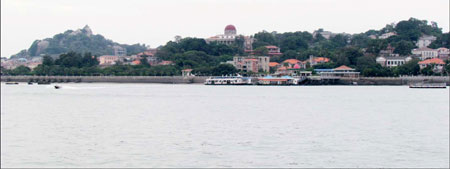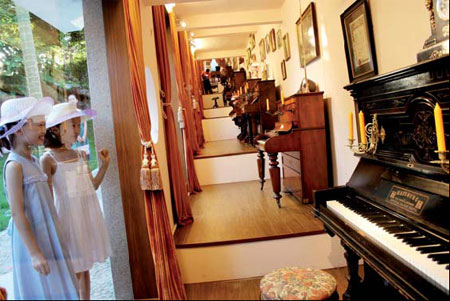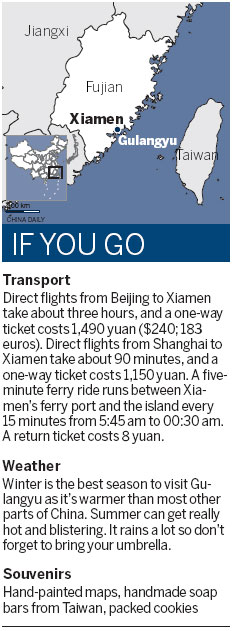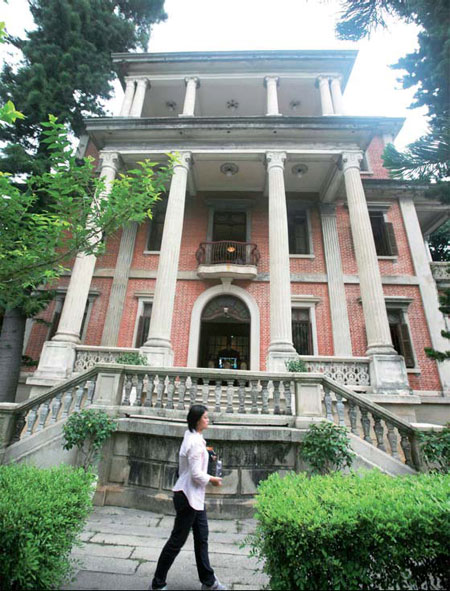Sun, sea and serenity
Updated: 2012-12-07 09:08
(China Daily)
|
|||||||||||

|
From top: A panorama of Gulangyu, the largest satellite island of Xiamen; Gurong Villa, built in 1928, is hailed as the "King Villa" on the island; a corridor in the island's piano museum exhibiting different types of pianos. Photos Provided to China Daily |

With no cars or bicycles, a stroll among Gulangyu's winding streets can be a truly tranquil experience
Just as Europeans have Mediterranean resorts and Americans have Florida to flee to in the depths of winter, Chinese have Gulangyu. There are fewer better places to go to when bone-chilling temperatures become simply too hard to bear. Gulangyu, the largest satellite island of Xiamen, in the southern province of Fujian, has a warm humid winter and hot summers, ideal for enjoying its relaxed lifestyle.
There is plenty to do on the island, but above all its main attraction is relaxation.
Just a five-minute boat ride from the mainland, it has beautiful beaches and stunning architecture ranging from quiet alleyways to colonial mansions.
The island is home to China's largest piano museum and many keen pianists.
It is also free of cars and bicycles, and on a warm afternoon you can happily lose yourself ambling along one of Gulangyu's winding lanes, occasionally catching a tinkle of piano keys drifting on the breeze.
It is two square kilometers and home to more than 16,000 people, and is a popular destination for Chinese and foreign tourists.
The island is ranked second in the list of favorite Chinese destinations for foreign travelers compiled by CNN's iReporters, second only to the Forbidden City in Beijing.
Here are just a few of the attractions:

1. Architecture
From baroque buildings and Gothic cathedrals to narrow, winding Fujian-style alleys and courtyards, Gulangyu is replete with various architectural styles.
It was once a remote and rather down-at-heel island with an economy based on fishing, but its fortunes changed after it became a trading port after China's defeat in the Opium War and the signing of the Treaty of Nanking in 1842.
Thirteen countries including the US, Britain, France and Japan established consulates, churches, and hospitals on the island, which was officially designated an International Settlement in 1902. It was occupied by Japan in 1942 until the end of World War II.
In addition to foreign-built houses, wealthy overseas Chinese built luxurious homes on the island. These, combined with colonial buildings, make Gulangyu something of an architectural museum.
There are few luxury hotels on the island. Most accommodation is family-run, friendly and often based on one of Gulangyu's historical buildings. In many cases the owners will let visitors, even those not staying with them, look around their hotel and take photographs.
2. Piano Island
Gulanyu is known as Piano Island or The Town of Pianos, because of its historical association with the instrument and its piano museum, which opened in 2000.
The museum's 100 pianos were donated by an Australian-Chinese, Hu Youyi. It includes pianos from around the world, among them one that is gold plated and one that has eight pedals.
Western missionaries introduced pianos to Xiamen at the beginning of the 19th century, and their legacy has lasted. Gulangyu has produced many famous pianists, including Zhou Su'an in the 1920s, Wu Tianqiu in the 1950s, Xu Feixing in the 1960s and Xu Xingai in the 1990s.
The island's name also has musical roots. Gulang means "waves hitting the drum", a reference to the sound of the sea crashing against the shore, and yu means islet.
Gulangyu's music hall is at the center of the island. It is closed during the day but at night offers free performances by musicians from the local music academy from 7:30 pm.
Since 2002 the island has hosted a biennial piano festival. The museum's pianos are also regularly exhibited in Beijing, Shanghai, Guangzhou and Hong Kong.
3. Food and Drink
Seafood dominates Gulangyu cuisine. Try Longwen Seafood Restaurant in Longtou Road, the main street linking the ferry port to the center of the island.
On the menu are delights such as stir-fried squid with celery and steamed sea bass. Opened in 1987, Longwen is the oldest restaurant on the island and a favorite among locals.
Fish balls, cookies and cakes are also popular. Lin's Fish Ball in Quanzhou Road is reputed for its fish balls stuffed with pork and cooked in a savory soup.
Elegant tea houses and cafes scattered around the island provide welcome relief after a long spell of exploring.
China Daily
(China Daily 12/07/2012 page23)
Today's Top News
Rescuers race against time for quake victims
Telecom workers restore links
Coal mine blast kills 18 in Jilin
Intl scholarship puts China on the map
More bird flu patients discharged
Gold loses sheen, but still a safe bet
US 'turns blind eye to human rights'
Telecom workers restore links
Hot Topics
Lunar probe , China growth forecasts, Emission rules get tougher, China seen through 'colored lens', International board,
Editor's Picks

|

|

|

|

|

|






